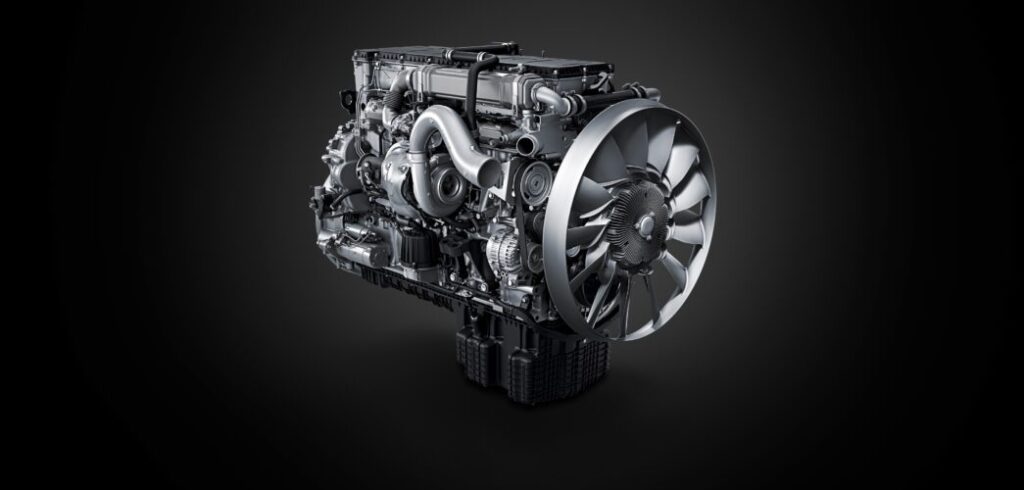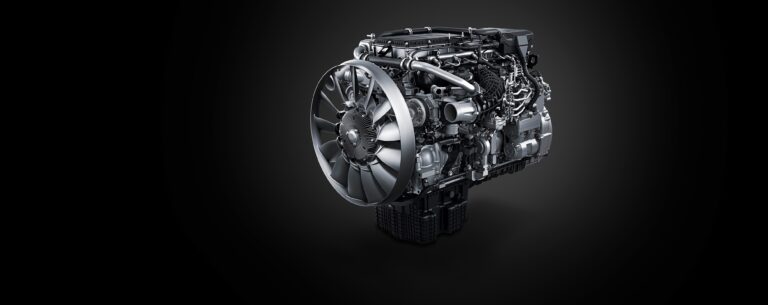Mercedes-Benz has launched the third generation of its OM 471 heavy-duty engine, which is available to order and will be available from late 2022. According to the manufacturer, the engine has been comprehensively revised, to reduce both emissions and running costs.
Karin Rådström, member of the Board of management of Daimler Truck Holding, responsible for the Europe and Latin America regions, and the Mercedes-Benz Trucks brand, commented. “With the third generation of the OM 471, we consistently focused on the needs of our customers. Our goal was to decrease the Total Cost of Ownership (TCO) and reduce fuel consumption. Our customers will benefit, as will the environment.”
Greater fuel efficiency is, says Mercedes, achieved thanks to optimization of the combustion system, the use of application-oriented turbochargers and friction reduction measures throughout the engine.
For example, the geometry of the piston recess, the injection nozzle design and geometry of the combustion chamber were subject to an extensive optimization process. This has allowed for the compression ratio of the six-cylinder in-line engine to be increased from 18.3:1 to 20.3:1, giving a peak ignition pressure of 250 bar.
Mercedes has also introduced two new turbochargers, developed and manufactured in-house, which are adapted to the broad range of customer requirements. In the consumption-optimized variant, the focus is on the lowest possible fuel consumption for use in long-distance haulage with an engine rated at up to 350kW (476hp).
The second turbocharger variant is designed for high-performance and a high engine braking force applications, making it ideal for use in the heavy-duty and construction sector with an engine rating of up to 390kW (530hp). For the lower and medium performance levels of the OM 471, Mercedes states that the maximum fuel saving compared with the previous generation is up to 4%, and for the upper performance levels up to 3.5%.
In addition to combustion and turbocharging, friction reduction is the third important arm of Mercedes’s approach to improving fuel efficiency. To this end, the OM 471 has a newly developed engine oil pressure control valve. This is installed behind the engine oil pump and in front of the oil thermostat. An electrical actuator enables characteristics map-controlled use of the pressure-reducing valve. Reductions in engine oil pressure are determined using a complex matrix that takes into account all engine components and their specific requirements, such as lubrication or cooling. A newly developed engine oil with low viscosity is also used, which the company states enhances oil pressure control, improving fuel efficiency without reducing oil change intervals or increasing the wear on affected engine components.
The exhaust gas aftertreatment system, which has been revamped and adapted to the new combustion and control system of the OM 471, also helps improve fuel efficiency. The system limits the backpressure and increases the uniformity index of the AdBlue, which leads to improved NOx conversion and lower fuel consumption. The NOx sensors, together with the closed and adaptive NOx closed-loop control circuit and a predictive SCR temperature model, have enabled emission stability to be improved even further. It is even compliant with the strictest emission standards, such as Euro VIe, which call for effective limitation of exhaust gas emissions over the entire normal service life of a vehicle under normal usage conditions.



